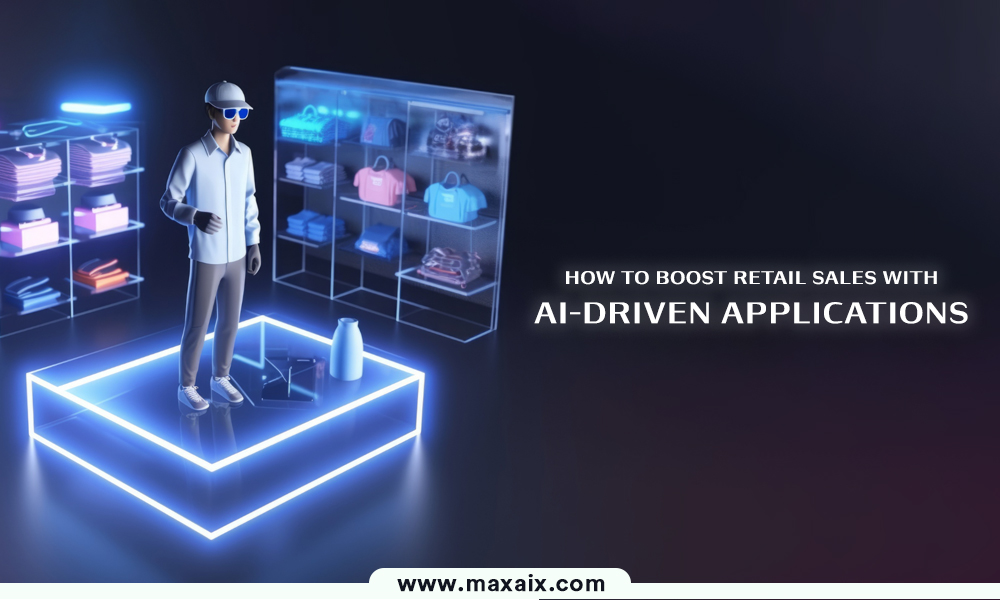AI-Driven Applications for Boosting Retail Sales

Artificial intelligence (AI) is changing how organizations operate, interact with customers, and spur development in the dynamic world of retail sales. This comprehensive book explores how AI-driven applications boost retail sales; it covers definitions, tactics, technologies, benefits, challenges, and opportunities going forward, with a focus on how Maxaix can support businesses throughout this shift.
Artificial Intelligence
The ability of robots to replicate human intellect—learning, problem-solving, perception, and decision-making, for example—is known as artificial intelligence (AI). Automation, efficiency, and creativity are encouraged across a range of sectors by AI systems, which use algorithms, data, and processing capacity to identify trends, provide forecasts, and gain insights.
AI-Driven Apps: An Overview
Applications with artificial intelligence capabilities are software programs or solutions that employ AI to carry out certain tasks, enhance capabilities, and add value for users. These applications improve outcomes in a variety of industries, including healthcare, banking, manufacturing, and retail sales, by automating procedures, personalizing user experiences, and utilizing machine learning, computer vision, and other AI techniques.
Artificial Intelligence in the Retail Sales Industry
Artificial intelligence is changing company models, consumer experiences, and operations in the retail sales industry:
- Consumer Insights: AI enables merchants to examine consumer information, the pattern of behavior, and inclinations to extract knowledge about consumer preferences, shopping inclinations, and reasons to buy, enabling tailored recommendations and targeted advertising.
- Inventory management: Artificial intelligence (AI)-driven algorithms forecast demand, adjust stock levels, and automate replenishment procedures, therefore lowering surplus inventory, decreasing stockouts, and improving supply chain effectiveness.
- Dynamic Pricing: To maximize revenue and profitability while maintaining competitiveness, AI-infused pricing systems dynamically modify prices based on market developments, competition pricing strategies, and consumer demand indicators.
- Customer service: AI chatbots and virtual assistants provide prompt assistance, answer questions, and fix problems. This increases customer happiness, speeds up response times, and frees up human agents to work on more complex duties.
Using AI Techniques in Retail Sales
A number of critical actions must be taken in order for AI methods to be successfully implemented in retail sales:
- Goals and Objectives: Clearly state the business objectives, goals, and KPIs that AI projects want to achieve. Examples of these include increasing sales, improving customer happiness, and streamlining processes.
- Data collection: To successfully train AI models and algorithms, and gather relevant data from sources such as consumer demographics, transaction history, inventory levels, and market trends.
- Model Development: Construct AI models and algorithms tailored to certain use cases and goals, such as product recommendations, customer segmentation, and demand forecasts.
- Integration: To guarantee interoperability, scalability, and usability, seamlessly integrate AI-powered apps into current platforms, workflows, and systems.
- Evaluation and Optimization: To improve accuracy, dependability, and commercial effect over time, continuously track AI performance indicators, examine results, and improve models.
Innovations and Solutions in AI-Driven Retail Sales Applications
Retail sales applications driven by AI make use of a variety of tools and platforms, including:
- Machine Learning: To enable predictive analytics, demand forecasting, and consumer segmentation, machine learning algorithms examine past data to identify patterns, trends, and correlations.
- Natural Language Processing (NLP): NLP techniques interpret and process human language, enabling sentiment analysis tools, chatbots, and virtual assistants to communicate with clients, evaluate reviews, and extract information from textual data.
- Computer Vision: Computer vision systems interpret visual data from pictures and videos, enabling merchants to do visual searches, monitor shelves, and identify products.
- Recommendation engines: To offer individualized product recommendations, cross-selling, and upselling possibilities, recommendation engines analyze user preferences, browsing history, and purchase activity.
Use Cases and Examples of AI-Driven Applications in Retail Sales
Applications driven by AI are used in retail sales in a variety of scenarios and use cases:
Customized Product Suggestions: Amazon uses artificial intelligence (AI) algorithms to provide customized product recommendations based on customers’ browsing and purchase histories, increasing user engagement and sales.
Dynamic Pricing: In order to maximize revenue and occupancy rates, airlines use AI-infused pricing technologies to dynamically modify ticket prices based on variables including demand, rival prices, and time to departure.
Inventory optimization: To predict consumer demand for items at specific stores, Walmart uses artificial intelligence (AI)-based demand forecasting algorithms. This helps to optimize inventory levels and reduce stockouts.
Chatbots and Virtual Assistants: H&M improves customer service and happiness by using AI chatbots on its website and social media channels to help customers with product questions, sizing recommendations, and order tracking.
Benefits of AI-Driven Applications to Optimize Retail Sales Processes
Applications driven by AI provide several benefits for merchants.
Improved Customer Experiences: AI-powered chatbots, virtual assistants, and personalized recommendations provide smooth and simple purchasing experiences that increase customer happiness and loyalty.
Enhanced Operational Efficiency: AI-powered solutions minimize expenses and boost productivity by automating repetitive operations, streamlining procedures, and optimizing resource allocation.
Data-Driven Insights: By generating actionable insights from massive volumes of data, AI analytics solutions help merchants see patterns, take advantage of opportunities, and make well-informed decisions.
Competitive Advantage: By providing cutting-edge services, refining pricing tactics, and adjusting to changing market conditions, merchants may maintain an advantage over rivals thanks to AI-powered applications.
8 Ways to Use AI-Driven Applications to Increase the Productivity of Your Retail Sales Business
The following are some ways that retailers may use AI-powered applications to improve performance and efficiency:
- Customized Marketing Campaigns: Use AI-powered data to target certain demographics, classify consumers, and provide tailored communications.
- Adaptive Pricing Strategies: Utilize pricing tools driven by artificial intelligence to adjust prices in real time in response to changes in the market, the prices of competitors, and consumer demand.
- Inventory Streamlining: Adjust inventory levels, cut down on stockouts, and lower the cost of retaining excess inventory by utilizing AI-based demand forecasting models.
- Automated Customer Service: Use virtual assistants and AI chatbots to handle consumer enquiries, recommend products, and quickly address problems.
- Visual Merchandising: Make the most of shop layouts and product placements by using computer vision technology to analyze shelf layouts, product displays, and consumer traffic patterns.
- Fraud Detection: To reduce financial losses and risks, use AI algorithms to spot fraudulent activity such as identity theft, payment fraud, and account takeover attempts.
- Predictive Maintenance: To keep an eye on the condition of your equipment, foresee maintenance requirements, and save costly downtime for your retail operations, use AI predictive analytics.
- Supply Chain Streamlining: Reduce transportation costs, improve delivery efficiency, and simplify logistics by utilizing AI-powered supply chain management systems.
Challenges and Risks of AI-Driven Applications in Retail Sales Businesses
AI-powered solutions in retail sales come with a number of risks and challenges despite their benefits.
Data Quality and Privacy: Since AI models require high-quality data for training and validation, there are problems around data quality and privacy compliance.
Algorithm bias: AI systems may exhibit preconceptions and biases present in the training set, resulting in unfair conclusions or discriminating judgments, especially when it comes to credit scoring, employment, and pricing.
Implementation Complexity: It can be difficult and time-consuming to integrate AI-powered apps into current processes and systems; this requires knowledge in data science, software development, and change management.
Regulatory Compliance: AI programs need to abide by rules and guidelines of algorithmic transparency, privacy, and data protection, including the Fair Lending Act, the CCPA, and the GDPR.
The Reasons Maxaix is a Trustworthy Option for Developing AI Applications
In the field of developing AI applications, Maxaix offers knowledge, creativity, and dependability:
Expertise: Maxaix offers cutting-edge solutions customized to the particular requirements and goals of retail sales organizations. The company has years of expertise in AI research, development, and implementation.
Expertise: The data scientists, software engineers, and subject matter experts at Maxaix have extensive knowledge in computer vision, natural language processing, machine learning, and other AI technologies.
Customization: Maxaix works directly with customers to understand their unique needs, create custom AI solutions, and provide high-value features and functions that promote company expansion.
Support: To guarantee the long-term success and efficacy of AI-powered apps in retail sales operations, Maxaix provides continuing support, maintenance, and optimization services.
The Future of AI in Retail Sales
Innovation, integration, and impact characterize the future of artificial intelligence in retail sales:
- Customization: AI will enable merchants to provide highly tailored experiences based on consumer behavior, individual preferences, and contextual data, increasing engagement and loyalty.
- Automation: the application of AI to automation will streamline procedures, improve performance, and enable independent decision-making at every stage of the retail value chain, from customer care to supply chain management.
- Artificial Intelligence: AI will augment human skills by providing real-time insights, predictive analytics, and astute recommendations to retail sales professionals, therefore increasing their performance and productivity.
Applications driven by AI have enormous potential to transform retail sales processes, spur expansion, and offer first-rate customer service. Retailers may find new possibilities, overcome obstacles, and stay one step ahead of the competition in the digital age by utilizing AI technology. You may confidently achieve your company goals and set out on a prosperous AI path with Maxaix as your trustworthy ally.
To sum up
Applications driven by AI have enormous potential to transform retail sales processes, spur expansion, and offer first-rate customer service. Retailers may find new possibilities, overcome obstacles, and stay one step ahead of the competition in the digital age by utilizing AI technology. You may confidently achieve your company goals and set out on a prosperous AI path with Maxaix as your trustworthy ally.
Frequently Asked Questions: (FAQ)
What benefits does AI provide for retail sales?
AI improves retail sales by providing individualized connections with customers, streamlining procedures, streamlining inventory control, and supporting judgment calls.
Could you give some instances of AI-driven retail sales applications?
A few instances of AI-driven applications in retail sales are virtual assistants, chatbots, recommendation engines, and predictive inventory management programs.
What benefits does AI provide to retail sales?
AI has several benefits for retail sales, including better decision-making, more productivity, and a better consumer experience.
What barriers exist for integrating AI into retail sales?
Concerns about data privacy, the need for large amounts of data, the high cost of implementation, and the possibility of job displacement are the barriers to applying AI in retail sales.
How can I use AI to increase the efficiency of my retail sales business?
By automating repetitive processes, increasing customer service, boosting sales forecasting, customizing client experiences, and optimizing pricing strategies, artificial intelligence (AI) may help you increase the efficiency of your retail sales organization.
Why should I trust Maxaix to create AI applications?
A team of seasoned AI engineers leads Maxaix, a leading AI application development firm. Maxaix offers custom AI solutions made to meet the unique requirements of retail establishments.
What prospects does AI have for retail sales going forward?
AI’s prospects for retail sales are promising; more sophisticated AI-powered apps, increased customization, increased efficiency, and other things are anticipated.
How does artificial intelligence help with retail sales inventory management?
By anticipating demand and maximizing inventory levels, artificial intelligence helps in inventory management by lowering stockouts and overstocks.
How does AI enhance the retail sales experience for customers?
By providing tailored product recommendations, responding to consumer questions, and assisting with transactions, artificial intelligence enhances the retail sales experience for customers.


